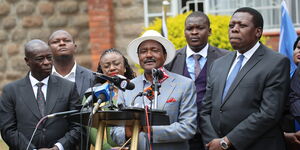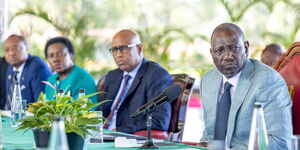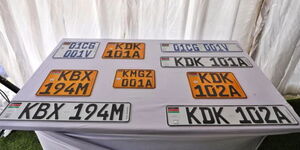Economist David Ndii on Tuesday, March 31 tore into city lawyer Donald Kipkorir who had advised the government to print Ksh750 billion and inject it into the economy as part of the country's response to the Covid-19 pandemic.
In a thread on Twitter, Kipkorir had observed that countries including the United States, the United Kingdom and Peru were injecting billions of dollars into their economies through a process known as Quantitative Easing to cushion them from the shocks brought about by the pandemic.
"Above money is from printing excess money, sexily called Quantitative Easing. Kenya prints $7.5B (about Ksh750 Billion) & gives every county equivalent to 50% of its annual budget to be used to pay all bills, even those with disputes (EACC/DCI to follow those cheating/stealing). And the central government to use the balance to pay all other bills. The economy will survive," Kipkorir had argued before Ndii dismissed the proposal as 'wash wash economics'
Ndii then hit back with a detailed analogy explaining why Kipkorir's proposal was not feasible. In the economist's analogy, Ndii cast Kipkorir as the president of a fictional nation called Kiplombe, referring to the lawyer as 'Young Billionaire Sonko Malong'.
The pair have clashed online on several occasions over their divergent viewpoints on various issues.
In his analogy, however, Ndii used the fictional nations of Kiplombe and Cheptongei to break down why quantitative easing was not the same as printing money.
According to Investopedia, Quantitative Easing (QE) is a form of unconventional monetary policy in which central bank purchases longer-term securities from the open market in order to increase the money supply and encourage lending and investment.
In Ndii's analogy, the President of Kiplombe, Sonko Malong, ordered the printing and distribution of 3 million Kiplos (the currency in Kiplombe) after winning the election, much to the delight of many citizens.
Malong's decision, however, affected established trade relations between Kiplombe and Cheptongei which had been trading bags of maize and beans for years.
The new money in circulation had driven up the price of a bag of maize in Kiplombe to 4,500 Kiplos a bag from the previous 3,000 Kiplos, meaning Cheptongei did not have enough Kiplos in its forex reserves to purchase the maize at that price.
In response, Cheptongei were only willing to sell their beans at the hiked price of 9,000 Cheptos (the currency in Cheptongei) to enable them to raise enough Kiplos to purchase maize from Kiplombe at the new price.
"First, President Malong suffers from money illusion. He thinks money is wealth. No one told him that money is a medium of exchange. Two bags of maize for one of beans, a unit of account (maize is KP3,000 a bag in Kiplombe) and a store of value 1.5 million Cheptos forex reserves to buy beans next season instead of storing maize which may be eaten by weevils.
"Second, candidate Malong reads too much financial punditry in the newspapers and blogs talking about quantitative easing and money printing interchanging, and assumed he knew what they were talking about," the analogy read in part.
Coincidentally, Cheptongei is the name of the village where Kipkorir hails from in Elgeyo Marakwet County.
Ndii went on to attach images of Kipkorir posing with his cars on social media, having previously accused the lawyer of 'failing to get over living in Karen'
"You see, Young Billionaire Sonko Malong, LLB YB (Wash Wash) has no idea where stuff comes from. All he knows is, you have more money, you buy more stuff.
"Postscript: President Malong and the Upper Deck Congress (a.k.a the Karenistas) were whitewashed in the next general elections. The first policy of the new government was to decree that law would no longer be offered as a first degree," Ndii wrote in a jab at Kipkorir.
The lawyer took to his twitter page to respond, accusing Ndii of hiring a mob to attack him online, further criticising him for calling him names.
"David Ndii has repressed anger. His anger against big families in Kenya is because he thinks that as a child of Mau Mau parents, he should be owning Kenya. That he can’t engage in a public debate but instead hires trolls to unleash bots shows a man with deep-seated insecurities.
"Genuine Intellectuals defend their positions without defaulting to name-calling ... We leave name-calling to charlatans & prostitutes & deranged mobs baying for blood. Ndii’s conduct to hire a mob shows he is a Fraudster," Kipkorir wrote.
Read Ndii's full analogy below:












